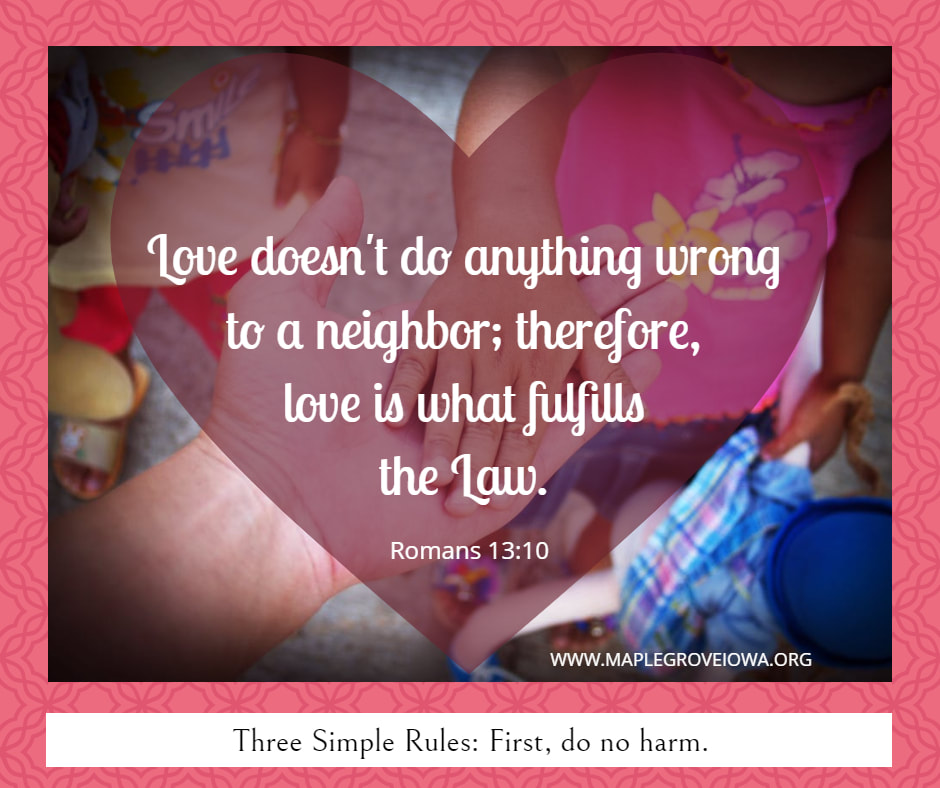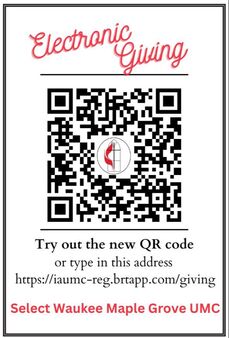|
Follow along with daily scripture readings and insights that will enhance your faith journey.
|
MAPLE GROVE UNITED METHODIST CHURCH
Primary Scriptures: Romans 12:9-18; 13:8-9 Book: Three Simple Rules: A Wesleyan Way of Living (Rueben P. Job) MONDAY 2.18.19 Exodus 20:13-17
In the saga of how God relates to people, the Ten Commandments came at a pivotal moment. The Israelites had been slaves in Egypt for 400 years. They had learned the Egyptian culture, the brutal, dominating behavior of their masters. Now God called them to a very different quality of life, one that sought to avoid doing harm to others. • Murder’s harmfulness is pretty clear. Think about the ways that adultery, stealing and giving false testimony against your neighbor cause harm. How have these behaviors harmed you, or someone you knew well? What kinds of things can we “steal” from others besides money or possessions? • The Cambridge Advanced Learner’s Dictionary defines “covet” as “to want to have something very much, especially something which belongs to someone else.” If you covet, who does that harm? In what ways can coveting open the door to some of the harmful behaviors named in the previous commandments? TUESDAY 2.19.19 Leviticus 19:9-18 Jesus said Leviticus 19:18—“Love your neighbor as yourself”—is a vital life rule. An expert in the law asked him, “Who is my neighbor?” In reply, Jesus told the well-known parable of the Good Samaritan (Luke 10:25-37). But the expert could have known that Leviticus, in the verses before the command, already listed many “neighbors” God’s people shouldn’t harm. • Have you ever heard the phrase “Don’t leave any money on the table,” urging you to squeeze every penny out of someone else in a business deal? How did the commands in verse 9-10, 13, and 16 urge the Israelites to deal with others? How can you as a Christian decide whether guarding your interests does or does not harm others? • “Sticks and stones may break my bones, but words can never hurt me.” That saying may help a child cope with playground taunts, but as adults we know words can do great harm. Especially as the next election year heats up, what principles do verses 12-13 and 15-18 teach that bear on how we speak to one another, and about candidates for office? WEDNESDAY 2.20.19 Romans 13:8-14 Paul sent this letter to a set of Roman house churches. In Romans 14-15, we see that these churches were very different. Some were mainly Jewish; others mostly Gentile. Their customs and standards of “righteousness” varied. It was all too easy for them to quarrel and tear each other down. “Love does no harm” was a big challenge, a crucial call. • Bishop Reuben Job says “each of us knows of groups locked in conflict…the conflict is real, the divisions deep, the consequences often devastating. If…all involved can agree to do no harm, the climate in which the conflict is going on is immediately changed.” (Three Simple Rules) How might ugly religious conflicts (e.g. the Salem witch trials, the Inquisition) have been different if Christians had always aimed to “do no harm”? How can you stand for truths that matter to you without harming those who disagree? • Which of the “deeds of darkness” Paul listed mainly harm the doer? Which of them harm others? In what ways does “do no harm” challenge you to avoid harming yourself? THURSDAY 2.21.19 Galatians 5:13-21 In Three Simple Rules, Bishop Job asks if one reason we don’t choose to live into “do no harm” may be that “we are afraid of its consequences. To abandon the ways of the world for the way of Jesus is a radical step.” Paul called the Galatian Christians to let the Holy Spirit’s presence radically change their lives. • Paul describes the way of life he’s talking about with the phrase “walk by the Spirit.” When have you experienced what we sometimes calls “inner nudges” that move you toward the right, or away from what is harmful? How can you learn to be more attuned to the Holy Spirit’s leading in your life? • Who have you known whose life consistently followed the pattern of doing no harm to others? In what ways did that person’s life avoid the negative traits that Paul lists in this passage? What positive impacts did (or does) that person’s life have on you and on others? FRIDAY 2.22.19 1 Thessalonians 5:16-24 Paul wrote that to reject whatever is harmful makes space for all kinds of beauty in life. He lived in the Greco/Roman world. Its people enjoyed violent gladiatorial fights and chariot races, practiced “sacred” prostitution, and worshiped scheming emperors as gods. In many ways, we face similar choices about our attitudes and entertainments today. • How much do the positive qualities of life Paul listed in this passage (e.g. rejoicing, praying, being thankful) appeal to you? How can you nurture an inner appetite for the good? In what ways do you find that choosing harmful attitudes and actions (to yourself or to others) reduces your appetite for the good things God offers? • “Do not put out the Spirit’s fire,” Paul wrote. In what different ways do you believe God can communicate with you, helping you to discern what is harmful from what is good and helpful? How can you give the Bible’s principles, prayer, and sharing with Godly friends a larger role in your decision-making? SATURDAY 2.23.19 Isaiah 11:1-9 In Three Simple Rules, Bishop Job writes that “even a casual reading of the gospel suggests that Jesus taught and practiced a way of living that did no harm. His life, his way of life, and his teaching demonstrated so well this first simple rule.” Jesus is the biggest reason for us to adopt this approach to life. Isaiah wrote prophetically about God’s dream of a world restored through the Messiah’s work, a world where “they will neither harm nor destroy.” • Imagine a world where people never purposely harm or destroy. If they unintentionally do harm, they quickly apologize and make things right. How much tension, fear and grief would a world like that have? What one step will you take today to make yourself more aware of any harm you may be doing to others, especially those you love? Ask God for help. Seek pastoral or professional help if you need to. Do no harm. Family Activity: In all families, we say words that hurt each other. Read Proverbs 16:21. Create a family encouragement jar. Cut out 30-40 slips of paper. On each slip, write a word or phrase of love, support, care or hope. Think about what words lift you up and include those as a blessing to others. Place all of the slips in a jar. Any time a family member has spoken words of harm, he or she can then pull out a slip of paper, apologize, then say something encouraging. Better yet, work toward not speaking words of harm at all. When you need help, go to the jar for ideas and inspiration! Ask God to help you use your words for good. PRAYERS FOR THE WEEK: God of love, mercy and justice, it’s been said that “hurt people hurt people.” I’m sad when others hurt me, but I’m also sad when I hurt others. Heal my hurting self and transform me from the inside out. Teach me to want what you want, to love as you love, to do no harm. In the name of Jesus who did no harm to those who harmed him. Amen. Pray for General Conference February 23-26, St. Louis, MO www.gc2019.iaumc.org Pray for our Iowa Delegates Phil Carver Katie Dawson Diane Wasson Eberhart Becky Heeren Brian Milford Norma Morrison John Rothlisberger Darcy Rubenking Craig Scott Lilian Gallo Seagren Tom Shinkle Barrie Tritle
0 Comments
Leave a Reply. |
GPS GuideWhether you’re just starting to explore the Christian faith, or you’re a long-time Christian, we want to do everything we can to help you on your journey to know, love and serve God. The GPS (Grow, Pray, Study) Guide provides Scripture and insights to enhance your journey.
Archives
April 2019
Categories |
|
9155 Ashworth Rd
West Des Moines, IA 50266 Mailing address: PO BOX 845, Waukee, IA 50263 515.987.1402
Pastor Robbin 515-577-5714
Contact us at [email protected]
|

 RSS Feed
RSS Feed

